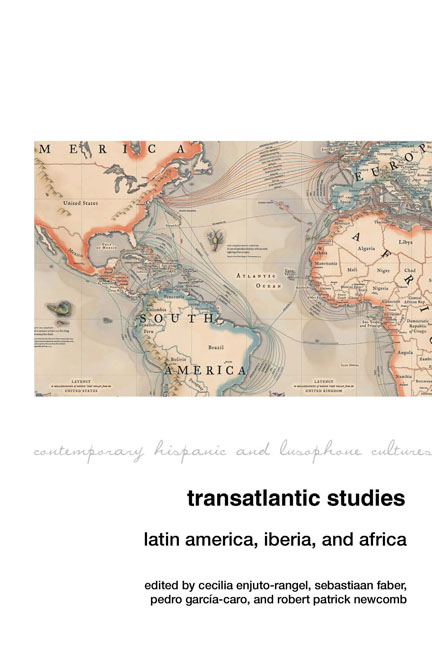Book contents
- Frontmatter
- Contents
- Introduction: Transatlantic Studies: Staking Out the Field
- Transatlantic Methodologies
- Transatlantic Linguistic Debates
- Transatlantic Displacement
- Transatlantic Memory
- Transatlantic Postcolonial Affinities
- Transatlantic Influence
- Epilogue: The Futureâif There Is OneâIs Transatlantic
- Index
33 - Hispanisms in the Works of Pedro Henríquez Ureña
- Frontmatter
- Contents
- Introduction: Transatlantic Studies: Staking Out the Field
- Transatlantic Methodologies
- Transatlantic Linguistic Debates
- Transatlantic Displacement
- Transatlantic Memory
- Transatlantic Postcolonial Affinities
- Transatlantic Influence
- Epilogue: The Futureâif There Is OneâIs Transatlantic
- Index
Summary
In July 1917 Pedro Henríquez Ureña left Minnesota, where he was writing his doctoral dissertation on Spanish versification at the state university, and traveled to Spain. As José Luis Abellán notes: “[Alfonso] Reyes será la mano tendida desde Madrid” [Alfonso Reyes would be the outstretched hand from Madrid] in Henríquez Ureña's first experience of the Iberian Peninsula (2000: 548). There in Spain he came into contact with the Centro de Estudios Históricos, founded and directed by Ramón Menéndez Pidal. In the Center’s library and archives, Henríquez Ureña found ample documentation to further his research on Spanish poetic meter, a topic which produced nine published articles and was also based on his ongoing doctoral research. There at the Center, he initiated a friendship with Tomás Navarro Tomás, an expert on the subject. The Dominican's interest in irregular versification had been piqued after finishing his Master's thesis in Minnesota, and the two colleagues discussed it extensively. Henríquez Ureña's visit to Spain allowed him to complete his dissertation, which he defended at the end of that summer upon returning to the United States. But in 1919 he returned to Madrid to do more research on Spanish versification at the Center of Historical Studies, “otra vez junto a su amigo Reyes, y con este nuevo viaje fue creciendo su relación con los amigos del Centro” [again alongside his friend Reyes, and on this trip he developed his relationships with his friends from the Center] (López Estrada 2000: 588). The thesis was finally published in 1920, under the title La versificación irregular en la poesía española, and later appeared in the Revista de Filología Española. The second edition, produced in 1933, boasted a prologue by Menéndez Pidal where he stressed how Henríquez Ureña devoted himself “al estudio de todas las épocas de esa versificación variamente irregular” [to the study of all the ages of that diversely irregular versification] beginning with its medieval origins and arriving at “la lírica de las zarzuelas y del género chico y hasta la revolución contemporánea iniciada por Rubén Darío” [the zarzuelalyric and that of the génerochico through the contemporary revolution initiated by Rubén Darío]. Menéndez Pidal, the patriarch of Spanish philology, concluded his prologue proclaiming that the author had “conquistado una nueva provincia para la historia literaria” [conquered a new province for literary history] (2000: 712).
- Type
- Chapter
- Information
- Transatlantic StudiesLatin America, Iberia, and Africa, pp. 406 - 417Publisher: Liverpool University PressPrint publication year: 2019



